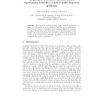Free Online Productivity Tools
i2Speak
i2Symbol
i2OCR
iTex2Img
iWeb2Print
iWeb2Shot
i2Type
iPdf2Split
iPdf2Merge
i2Bopomofo
i2Arabic
i2Style
i2Image
i2PDF
iLatex2Rtf
Sci2ools
131
Voted
LION
2010
Springer
2010
Springer
Adapting to a Realistic Decision Maker: Experiments towards a Reactive Multi-objective Optimizer
The interactive decision making (IDM) methods exploit the preference information from the decision maker during the optimization task to guide the search towards favourite solutions. This work measures the impact of inaccurate and contradictory preference information on the quality of the solutions generated by the IDM methods. The investigation is done in the context of the BC-EMO algorithm, a recently proposed multi-objective genetic algorithm.
Contradictory Preference Information | LION 2010 | Multi-objective Genetic Algorithm | Optimization | Preference Information |
| Added | 30 Aug 2010 |
| Updated | 30 Aug 2010 |
| Type | Conference |
| Year | 2010 |
| Where | LION |
| Authors | Paolo Campigotto, Andrea Passerini |
Comments (0)

